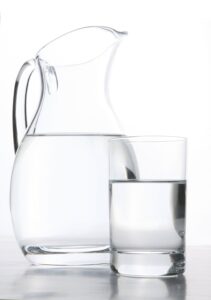Would You Know if Your Parent Was Dehydrated?
Dehydration can happen to anyone, but certain groups of people are at higher risk for it. Older adults are one of those groups. Seniors naturally have less fluids in their body, so they become dehydrated more easily. They may also have chronic conditions that further increase risks. Some medicines also have a risk of dehydration as a possible side effect. In addition, mobility problems can make it hard for seniors to get drinks for themselves. With the increased risk of dehydration for seniors, it’s important that family caregivers recognize the symptoms.
Situations that Make Dehydration More Likely

Home Care Bellaire, TX: Seniors and Dehydration
In some situations, older adults are even more likely to become dehydrated. Some situations in which you’ll need to be even more vigilant and offer more liquids are:
- During Illness: Vomiting and diarrhea cause the body to lose fluids. Older adults should drink more water to replace lost liquids. Fever can also cause a loss of fluids.
- Increased Sweating: Sweating makes the body lose water, so older adults should drink more in hot weather or when they are exercising.
- Increased Urination: Some medications can cause a person to urinate more. Diabetes that is undiagnosed or not well-controlled may also increase urination.
Symptoms of Dehydration
Thirst is usually an indicator that dehydration is imminent. However, older adults often don’t feel thirst in the same way as younger adults. They may not recognize when they need a drink. Other symptoms of dehydration include:
- Urine that is dark in color. When a person is well-hydrated, their urine should be nearly clear in color.
- Urinating less.
- Fatigue.
- Dizziness.
- Confusion.
When dehydration gets more severe, symptoms include:
- Eyes that appear sunken.
- Lack of sweat.
- Skin that looks dry and shriveled.
- Rapid heartbeat.
- Fever.
- Loss of consciousness.
How Home Care Can Prevent Dehydration in Seniors
There are several ways that home care can help to prevent older adults from becoming dehydrated, such as:
- Water Bottle: Keeping a water bottle nearby can make a senior more likely to drink enough water. Home care providers can keep the water bottle filled with fresh, cold water and keep an eye on how much the person is drinking.
- Foods with Liquid: Some foods contain a lot of liquids and can help reduce the risk of dehydration. Home care providers can offer foods and snacks like watermelon, soups, and other foods that have a high water content.
- Keeping Cool: Home care providers can help seniors to keep their houses cooler by opening windows, turning on fans, and running the air conditioning.
Knowing that a home care provider will be checking on your aging relative on hot days can give you peace of mind, too. Home care providers can make sure the older adult is staying hydrated and report back to family caregivers if they notice a problem.
If you or an aging loved one are considering Home Care in Bellaire, TX, contact the caring staff at Personal Caregiving Services at 832-564-0338. Providing Care in Houston, Bellaire, West University Place, Katy, and Sugar Land and the surrounding areas.
Sources
https://www.mayoclinic.org/diseases-conditions/dehydration/symptoms-causes/syc-20354086
https://www.medicalnewstoday.com/articles/153363.php
https://www.parentgiving.com/elder-care/dehydration-a-hidden-risk-to-the-elderly/
- Why Maintaining Flexibility Is So Important For Seniors - April 3, 2025
- Home Care Assistance Helps Seniors Manage Medical Appointments - March 19, 2025
- Symptoms and Causes of Edema in the Legs and Feet - March 5, 2025
